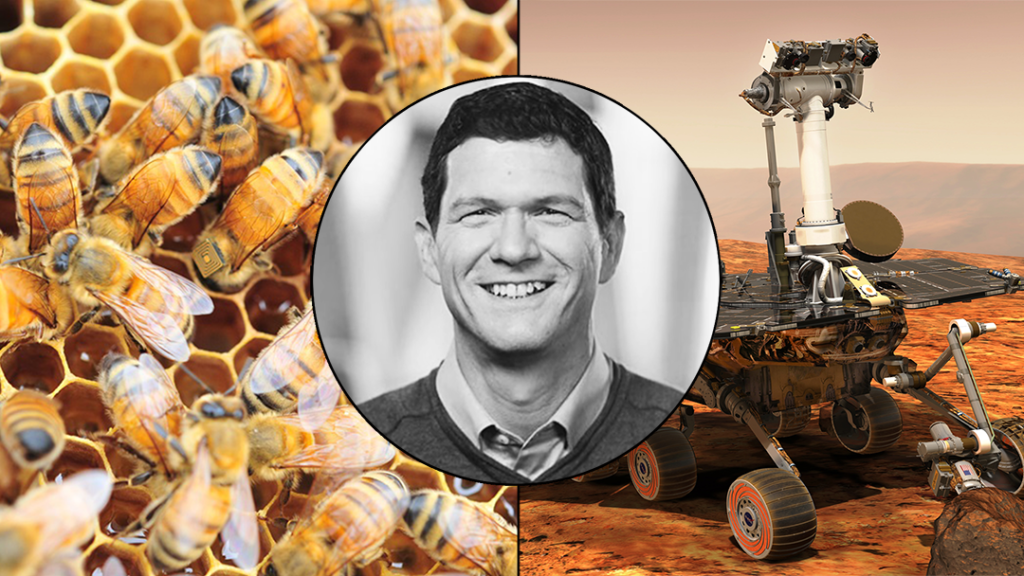
Professor de Souza’s research fingerprint can be found worlds apart, from micro-sensors hitched to terrestrial honeybees to water-detecting gear on Opportunity—a rover transmitting data across the expanse of space from the red soils of Mars.
Meet Professor Paulo de Souza, internationally recognised researcher, Science Leader with our Data61, and lauded speaker on the pub-scene for Pint of Science 2018…or at least he will be. That’s right, Professor de Souza will be thrilling us lucky folks at two locations: Hobart (14th May) and Sydney (16th May) with his ultra-curious, multi-disciplinary talks.
Professor de Souza’s passion isn’t limited to scientific discoveries in isolation, but what those discoveries might tell us in concert, the emergent stories science can only reveal through collaboration, which means you’ll have to act quickly to secure tickets for a night at the pub you won’t forget so easily.
- Hobart, Monday 14th May, the Republic Bar and Café: Professor de Souza will be discussing his work with NASA, the nature of the Red Planet, and what we might expect to discover in the future.
- Sydney, Wednesday 16th May, the Harlequin Inn: Professor de Souza will be discussing the declining bee populations worldwide and the micro-devices giving us macro-insights into their threats.
For the rest of us who miss out on Professor de Souza’s talks, all hope is not lost. We’ve gone ahead and gotten a sneak peek of Paulo’s pub talks and written it up for you below. Thank us later.
Vanishing bees, growing appetites, and hive mind science
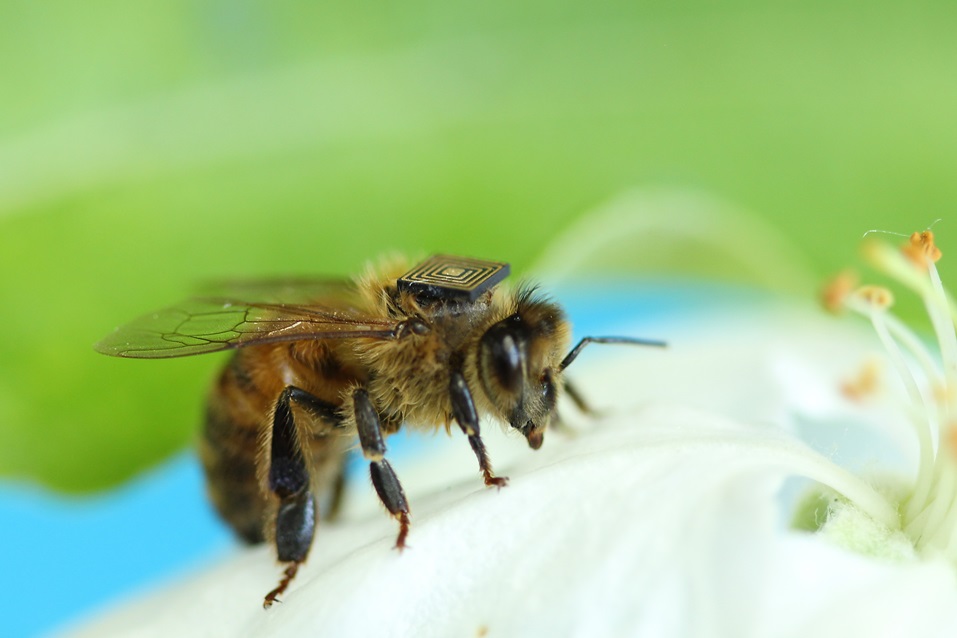
It’s estimated that one-third of our food is associated with bee pollination.
Splashing out on a café breakfast you might get the muesli, a meal full of colour: slices of kiwi, apple, and strawberries, hunks of orange and melons, all topped off with blueberries, slivered almonds, and a drizzle of honey. The Arabica-blend of coffee goes without saying. Though they might seem so to us, these ingredients are not eternal. They’re the fruits of flowering plants, pollinated by insects, specifically in these fruits’ case, bees.
Without bees, that muesli would have one ingredient: oats. How about the coffee? Bees. Sorry. Now, after getting on with pollinating for over 100 million years, the bees are disappearing.
‘We’ve had 50 years—half a century—of bees declining worldwide,’ says Professor de Souza. ‘If you look to the future there are just three decades before we need to produce 60 per cent more food if we are to feed our population. If we don’t have the pollinators, we can’t meet the target of this growing population on Earth. We have increasing food demands, but decreasing pollinator numbers.’
So why are the bees disappearing? ‘We have a number of candidates for this “bee assassination”: pesticides, pathogens, parasites, climate change—extreme weather events like heat waves, depletion of natural habitats, air and water contamination, even the radiation from mobile phone towers is believed to cause disorientation in bees.
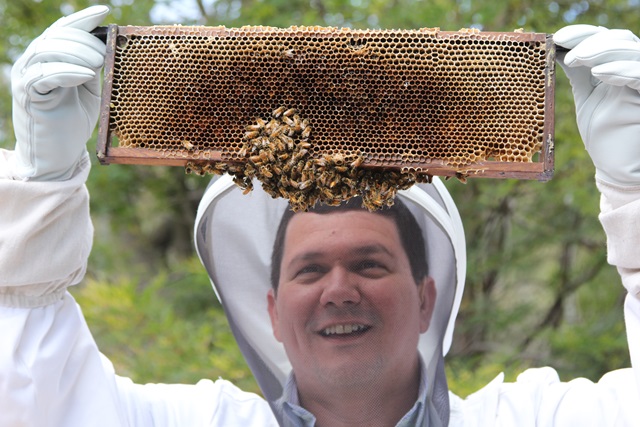
Multi-disciplinary science is the bee’s knees.
‘It’s still unclear, out of that perfect storm, which two or three of those aspects are going to be crucial to bees in a given region. To answer this question, we’ve got to get scientists to work together. No matter how big or well instrumented they might be, it’s impossible for a single research group to track all these issues at once.
‘So, this is when we decided to develop a technology to provide to scientists that they can use: micro-sensors that act like eTags, registering bees’ movements to quantify their exposure to hazards in the environment and more. We just ask for one thing in return: Send us the data. Whatever experiment it is, send us your piece of the puzzle and we will add it to all those from scientists worldwide working together and hopefully we’ll see the big picture of this problem. Not competing for discoveries, but cooperating for real advancement.’
In a way, this project—using artificial intelligence to crunch data from beekeepers and scientists spanning Kenya to the United Arab Emirates, Poland to Argentina, Brazil to Mexico and the UK—has turned the world of individual labs into a veritable hive mind, churning out global findings as it goes.
Bees and their backpacks are but one of Paulo’s interests. The other, as mentioned, looks starward—to Mars and its dark, damp history.
Drops of Mars and roving Opportunity
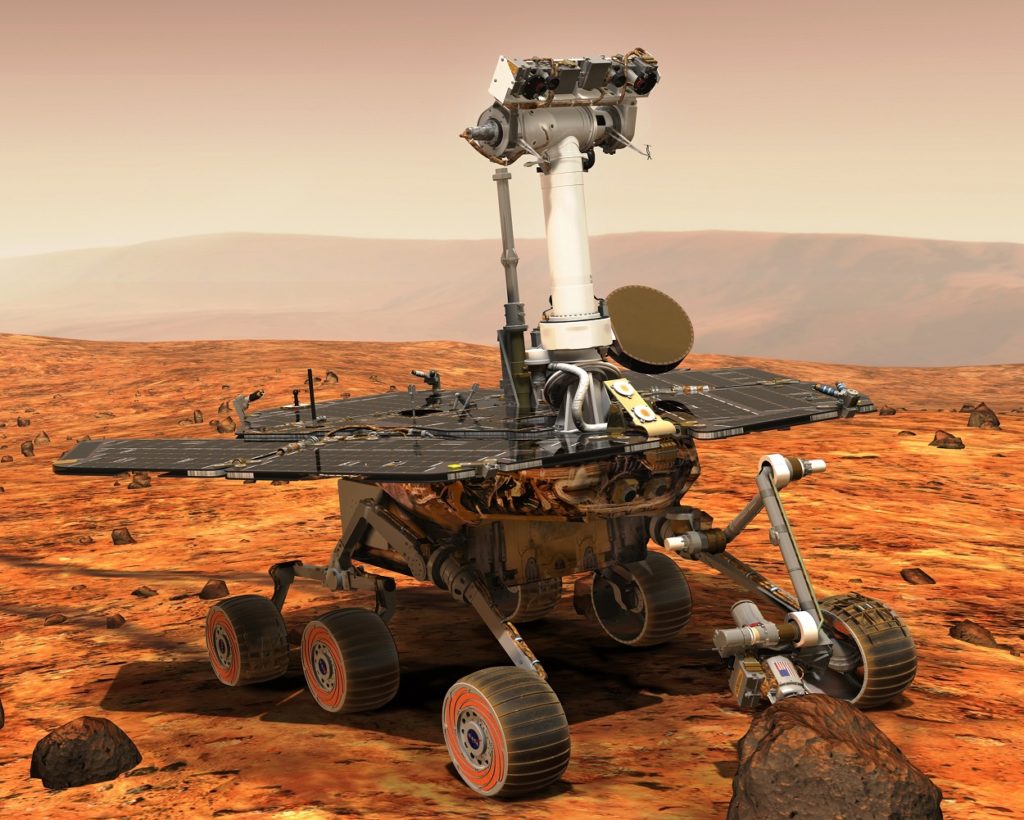
Opportunity on Mars. Image: NASA
‘I got my head checked by a jumbo jet; it wasn’t easy, but nothing is. No. Woo-hoo!’
Wise words from Blur and the Gorillaz’ Damon Albarn. Indeed, nothing’s easy, and this wasn’t more evident than with Beagle 2, a rover sent to Mars in 2003 by the European Space Agency bearing a sensor specially developed by Paulo and his team:
‘I have an instrument there [on Mars],’ said Paulo ‘—in pieces. It was the first sensor we ever developed for Mars and it actually crashed on the surface. It was the best one we ever built.’
Beagle 2 made it all the way to Mars, as planned, but something failed upon landing and the mission failed. We mention Blur because it was them who composed Beagle 2’s call-sign, a melody intended to be played on the craft’s successful landing on the Red Planet’s surface, and another piece of history lost to the tides of misfortune. But, all’s not lost.
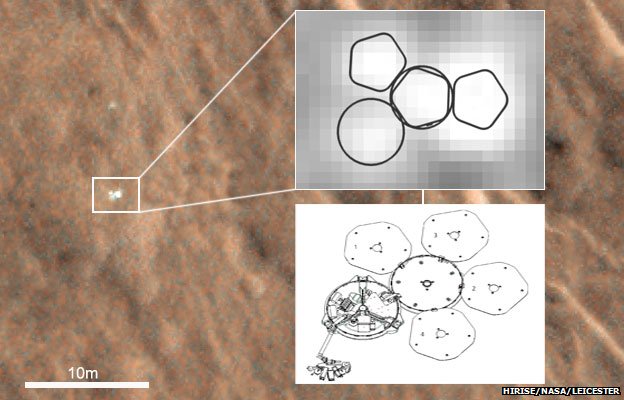
Beagle 2 was spotted for the first time over ten years later in early 2015 by the lens of the Mars Reconnaissance Orbiter (MRO). Image release by NASA/JPL
‘Soon after, in 2004, we landed with Spirit and then a few weeks later, with Opportunity. Before we landed we had only one objective: to discover if Mars was once wet. Water is essential for life as we know it. You have water; you have life. We already had evidence, all these geological features, that lead us to believe that Mars was once wet. But when we landed there with Viking in the seventies, the only thing we discovered was basalt, probably, a type of rock that’s never touched water. So there was a lot of speculation, but no concrete data.
‘Then we landed with Spirit and got the same picture: a dry past. It’s like looking at a history book of Mars’ surface and the only thing we see is physical erosion, rock to dust, and no water. And then we landed Opportunity. With Opportunity we found jarosite and haematite, minerals we can see in Australia. That was a huge discovery because we had proof—and that came from my instrument—that we had minerals that need water to be formed. Mars was once wet. There’s no question. This gives Mars the chance for life.
‘In the talk I’ll be talking about the evolution of our knowledge about Mars and how it came to this mission. [The rover is] still very active, analysing data, making decisions of what to do on Mars and hopefully leading to new discoveries. Opportunity was supposed to work for 3 months but it’s still working today. I get data from Opportunity coming into my phone every day. In fact, maybe the day of the talk I might get some images and I’ll share that with everyone, to see what it’s like on Mars.’
Paulo and Pint of Science
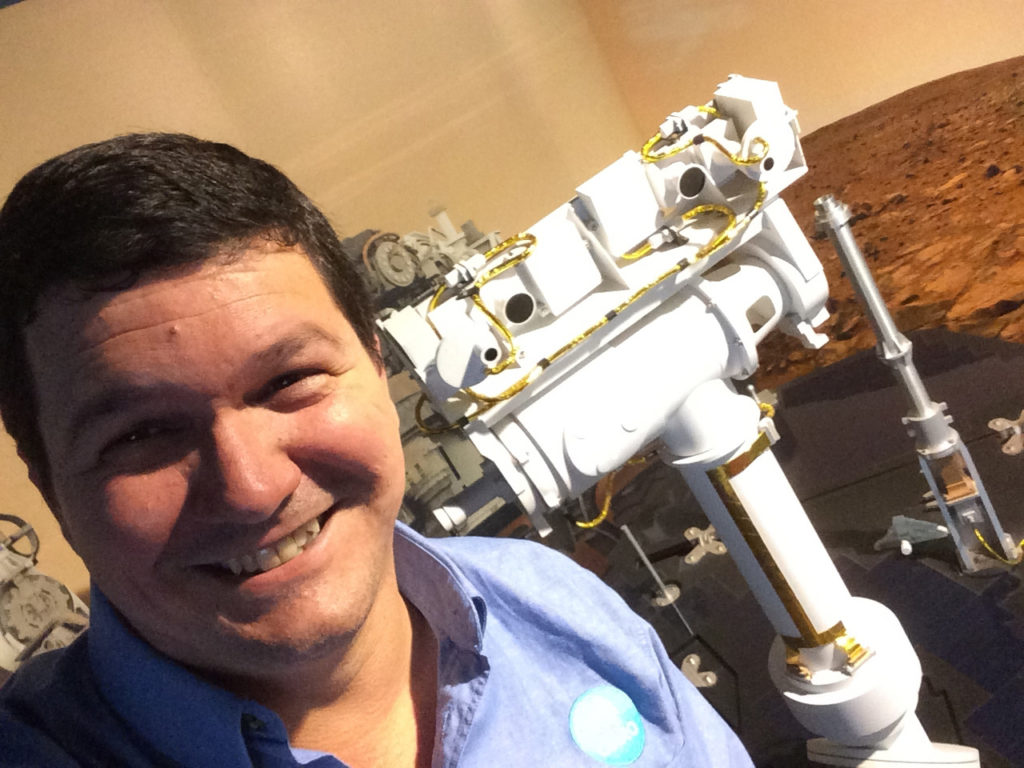
Paulo with Opportunity replica.
Though Professor de Souza has spoken at a pub before (‘it was the most relaxing audience, it was really good’)—he’s never spoken at Pint of Science. When asked what the audience might get out of his pub talk, this is what he had to say:
‘We can talk about a lot of things in the pub, so why not about science? We’ll be talking about big problems with bees, and Mars—I promise I’m going to take people to Mars. It’s certainly going to be very entertaining. It goes well with beer, it goes well with your favourite drink, and it’s going to be different. It’s going to be a sweet talk.’


4th May 2018 at 4:26 pm
Do any Mars rovers carry a Microphone, just imaging if it heard a cricket chirping, that would make it the most important instrument ever sent to Mars .